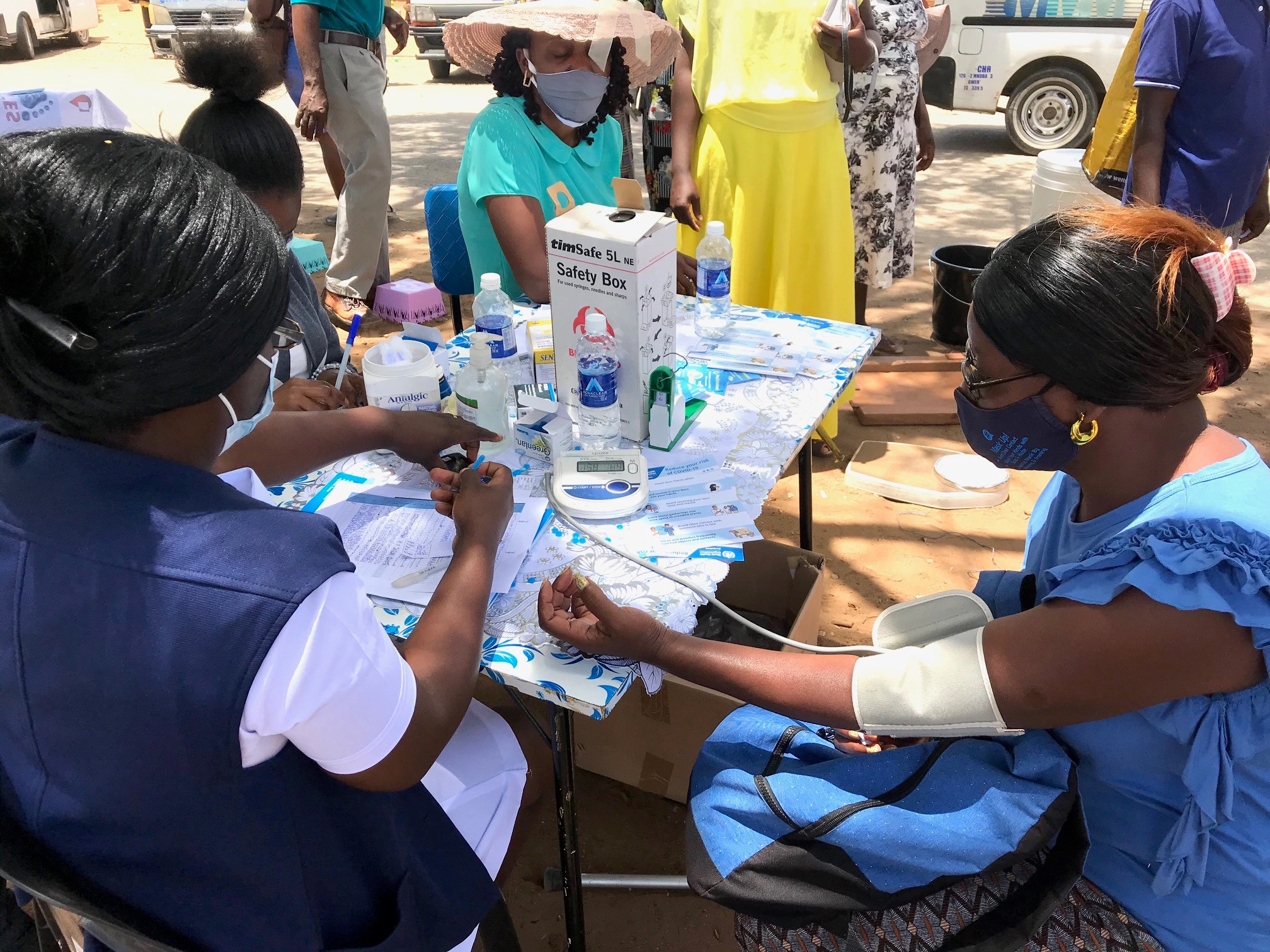World Diabetes Day: Nurses critical in screening and management of diabetes

By Vivian Mugarisi
Gweru, Zimbabwe, – Today, Zimbabwe and the international community observes the World Diabetes Day to raise awareness around the chronic illness. To mark this important day, the Government of Zimbabwe (GoZ), through the Ministry of Health and Child Care (MoHCC) have provided a three-day screening campaign for Gweru residents, with the support from the Zimbabwe Diabetes Association and WHO. The screening services were offered from 12-14 November and at least 800 individuals had been tested by Friday, as a way of establishing the prevalence of diabetes in the country for appropriate responses.
“This is a noble initiative that my whole community and I really appreciate and hoping this will be done more often. I cannot afford to pay for diabetes screening and treatment. In addition, the location was extremely convenient and l did not have to walk or pay an extra transport fee to get these services,” reveals, 63-year-old woman, Irene Zvenyika, one of the screening beneficiaries.
Irene has been living with diabetes for 19 years and professed that regular screening, sticking to a healthy diet and medical professionals’ advice has helped her manage the condition over the years.
Globally, by 2014 about 422 million people were living with diabetes, four times the number recorded in 1980 according to WHO Global report on Diabetes. Additionally, the African Region, has experienced a six-fold increase, from 4 million cases in 1980 to 25 million in 2014, with 60 percent of the 19 million people with diabetes in Africa not knowing they have it. Hence, why the screening in Gweru is extremely important.
“We need to continue reaching out to communities through free screening services for diabetes and continue with partnerships of this form for better health outcomes,” says, David Leboho, Zimbabwe Diabetes Association Acting President.
This year’s theme, Diabetes and Nurses (Diabetes: Nurses make the difference), focuses on amplifying the role of nurses in the prevention and management of diabetes. Diabetes is a major cause of blindness, kidney failure, heart attack, stroke and lower limb amputation. People with diabetes have also been seen to have bad outcomes when infected by COVID-19. Complications, can be avoided or delayed with medication, regular screening and treatment for complications. A healthy diet, physical activity and avoiding tobacco use can prevent or delay type two diabetes. Health workers, nurses in particular, have played a huge role in management of diabetic patients and have been in the fore front of Covid19 response.
In 2018, diabetes, accounted for 3 percent of all deaths in Zimbabwe, a huge jump from the 1 percent that was recorded in 2014. According to the Ministry of Health and Child Care (MoHCC) approximately 136 938 patients with diabetes have been registered and attended to at various institutions across the country this year. Consequently, Non Communicable Diseases (NCDs) are estimated to account for 33% of all deaths in Zimbabwe.
“In Africa, diabetes is becoming worse mainly due to over reliance on refined foods and lack of exercise. Therefore, diabetes awareness campaigns remain critical in beating NCDs in Zimbabwe,” says Dr John Mangwiro, MoHCC Deputy Minister and Chairperson of International Diabetes Federation for Africa Region.
“Also, the GoZ is making plans to ensure that instead of procuring drugs for diabetes management, local production is enhanced to reduce the cost of diabetes treatment,” added Dr Mangwiro.
While the general trends have been worrying, the Covid19 outbreak disrupted service provision, which saw many people across the globe failing to access health care services, including NCDs. At least 1 in 5 Covid19 deaths is linked to diabetes while the risk of complications or deaths are amongst people aged 60 years and above. The increase in diabetes cases has been attributed to the rise in type 2 diabetes, often driven by overweight and obesity due to sedentary lifestyles.
“We continue to support work being done by MoHCC in its response to NCDs. If diabetes is not treated or managed early, there are complications such as strokes or kidney failure which is more expensive and a heavy burden on our health system,” said Dr Edmore Munongo, WHO National Professional Officer for NCDs.
“Managing stroke or having dialysis is more expensive than managing diabetes when people are screened and diagnosed early,” added Dr Munongo.
WHO aims to stimulate and support the adoption of effective measures for the surveillance, prevention and control of diabetes and its complications, particularly in low- and middle-income countries. In addition, WHO has also been working with MoHCC to train more nurses and other health workers to expand access to diabetes prevention and care services through the WHO Package of NCDs Interventions (WHO PEN) for primary health care. Zimbabwe is one of the 25 countries where the model was adopted, and is working to decentralize and improve early diabetes detection and patient care together with other NCDs. To date, more than 80 health care workers have already been trained as trainers of other health workers in Zimbabwe under the model.
To this end, WHO provides scientific guidelines for the prevention of major NCDs including diabetes, develops norms and standards for diabetes diagnosis and care, builds awareness on the global epidemic of diabetes and conducts surveillance of diabetes and its risk factors.
Communications Officer
Tel: + 263 914 31408
Email: juliasw [at] who.int


